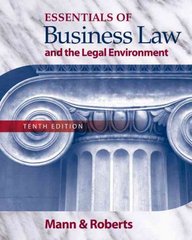Question
Suppose that a manufacturer uses two inputs: Labor (L) and heavy machinery (K), with output (Q) given by: (,) =k^(1/4) * L^(1/4) The manufacturer chooses
Suppose that a manufacturer uses two inputs: Labor (L) and heavy machinery (K), with output (Q) given by: (,) =k^(1/4) * L^(1/4) The manufacturer chooses the number of workers to hire every week, and chooses the number of heavy machines to lease every year. Suppose that workers cost W=16 and machinery costs R=25
A) If the firm wishes to produce 100 units of output, how much labor and capital will it hire to minimize costs, and what is the lowest cost of production?
B) Due to the imposition of Steel Tariffs, the cost of heavy machinery rises to R=36. In the short run, how will this affect the firm's choice of labor and capital, and how will this affect the firm's costs of production, assuming that the firm continues to produce 100 units of output?
C) In the long run, how will the tariffs affect the firm's choice of labor and how will it affect the firm's costs of production, assuming that the firm continues to produce 100 units of output?
D) Based on your answers to B and C, Immediately following the imposition of a tariff, are declines in corporate profits likely to be higher or lower than long-run declines? How about job losses?
Step by Step Solution
There are 3 Steps involved in it
Step: 1

Get Instant Access to Expert-Tailored Solutions
See step-by-step solutions with expert insights and AI powered tools for academic success
Step: 2

Step: 3

Ace Your Homework with AI
Get the answers you need in no time with our AI-driven, step-by-step assistance
Get Started


